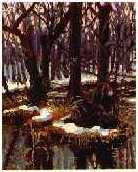
Step by Step Outline
of a Formal Analysis
(greater
detail and specifics are provided throughout the course)
1) Identify the art object
Be sure to include the object's title, artist,
dimensions, year completed, medium and also where the object is exhibited or owned.
It would be most helpful to include a color reproduction even if the object is
a reproduction in your textbook.
2) Give a complete description of the
subject matter
Remember to describe everything that you see in the picture
be it objective, non-objective or even abstract. A true description of subject
matter should be free of emotional reaction and highly detailed.
3) Describe
the emotional content of the chosen art object
The emotional content
of the work is a personal reaction. Perhaps the chosen object reminds you of an
event in your own life or better yet it could provoke an emotional or psychological
reaction. Relay your emotional response in detail!
4) Analyze each of
the formal elements of composition and principles of design
The elements
of composition are as follows: lines, space, color, texture, time and motion.
The principles of design are: balance, emphasis, scale and proportion, repetition,
rhythm and pattern, unity and variety. Look at the reproduction and analyze where
they exist and how they are applied by the artist. These terms are studied in
depth on this website.
5) Biography of the artist and history of his/her
era
Research and report on the artist, the relation to his/her art to
his/her era. Also research the historical and cultural developments that may
have played a part in the development of the work might have had an influence
on its subject matter.
6) Conclusion
Please conclude your analysis
with a paragraph or two restating your intent. Include a few personal thoughts
or insights about the artist, artwork or how it may have influenced you during
the course of your analysis.
other pages on this site

![]()